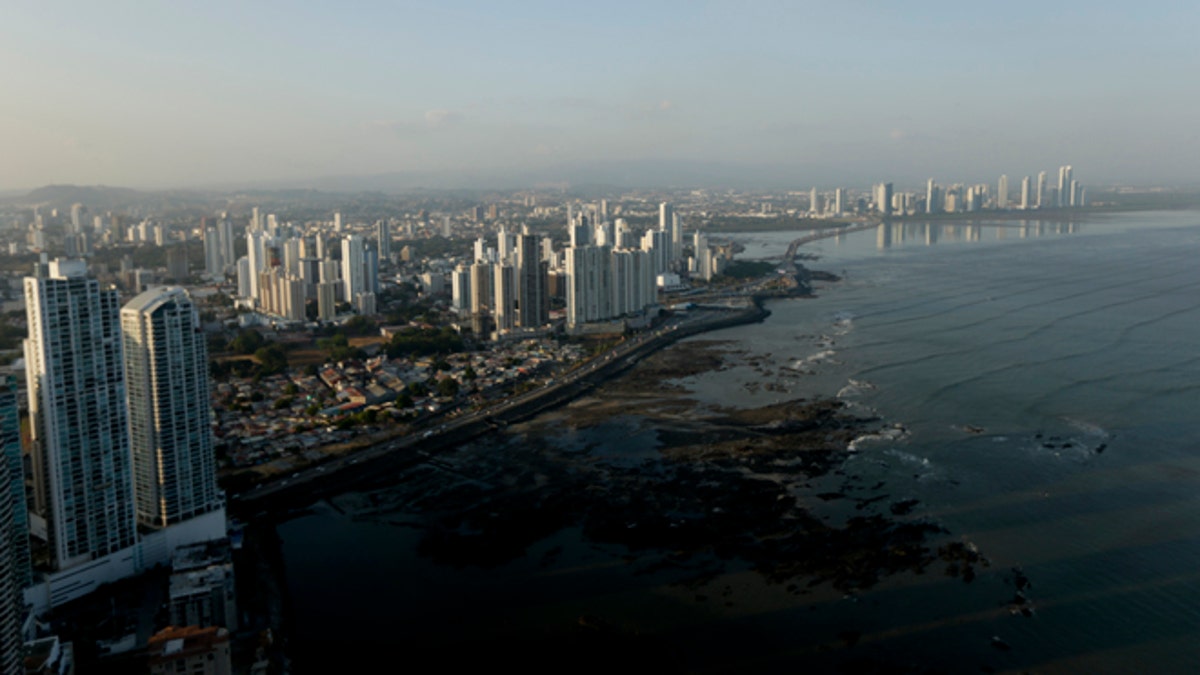
The setting sun lights up the Panama City skyline, Monday, April 4, 2016. (ap)
Reports based on the trove of 11.5 million classified documents taken from the Panamanian law firm Mossack Fonseca have shed light on the Central American nation’s role in offshore banking, money laundering and other ways the world’s elite hide their funds.
The so-called Panama Papers have made headlines around the globe amid revelations of the secretive bank accounts and companies of world leaders, celebrities and drug lords, but Panama’s role as a tax haven goes back almost 100 years.
“Saying you have an offshore bank account in Panama,” Chris Sabatini, a professor at Columbia University's School of International and Public Affairs told Fox News Latino, “is like saying you went to Times Square in the 1970s to get a massage.”
In 1919, Panama began registering ships in an attempt to help Standard Oil escape from Washington’s taxes and regulation. Other companies quickly followed suit in an attempt not only to avoid U.S. taxes but also to skirt laws forcing them to pay higher wages and maintain adequate working conditions.
While the idea of offshore banking soon followed – thanks in large part to Wall Street introducing lax company incorporation laws that allowed anyone start tax-free, anonymous corporations – it wasn’t until the 1970s that the industry really began to develop in Panama.
“Panama adopted the familiar tax haven model, based on the three pillars of tax havens: the tax exempt company, bank secrecy laws and competitive incorporation laws, adopting Swiss-style banking secrecy, abolishing currency controls and setting up tax exempt companies,” Armando José García Pires wrote in a 2013 academic study published by the Norwegian Center for Taxation.
The result made the Panamanian banking system the largest in Central America, but also attracted dictators, drug traffickers and corrupt officials from around the world interested in keeping their money safe and secret.
By the time strongman Manuel Noriega took control of the country in 1983, the country’s offshore firms were already handling money for dictators like Chile’s Augusto Pinochet and Haiti’s Jean-Claude “baby Doc” Duvalier.
Noriega, however, took shady banking to an entirely new level by basically nationalizing the country’s illicit money laundering industry and giving carte blanche to Colombian drug lord Pablo Escobar’s Medellín cartel to operate on the isthmus.
An economic downturn in the 1980s paired with a mounting criticism on the world stage over Noriega’s ties with narcotraffickers finally led the U.S. to invade Panama and overthrow the general in 1989.
Panama has since recovered, becoming a major tourist and retirement destination for a growing number of Americans. But accusations of money laundering, fraud and international tax evasion are still leveled against the country.
“It’s difficult for a country to grow so quickly like it has without something happening in the banking industry,” Sabatini said.
In light of the Panama Papers, the Panamanian government said it plans to create an international committee of experts to recommend ways to boost transparency in the county’s offshore financial industry.
President Juan Carlos Varela said Wednesday that the committee's findings will be shared with other nations so joint action can be taken to boost transparency in legal and financial centers worldwide.
As he takes steps to strengthen controls, Varela is also defending Panama against what he calls a "media attack" by wealthy nations that he says are ignoring their own deficiencies and unfairly stigmatizing Panama.
Varela, however, is in a difficult position as on one hand he has vowed to root out corruption as part of his platform, while on the other his country’s economic growth is tied in large part to the lax financial policies.
“He has promised to clean up corruption,” Sabatini said. “But any sort of reforms he makes will also take a huge hit on the financial sector.”
The Associated Press contributed to this report.
